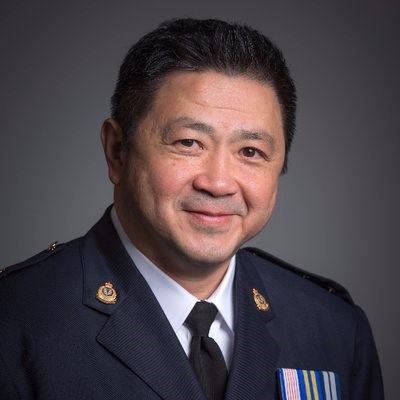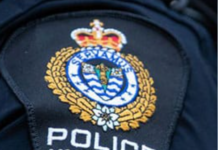85 VPD officers will participate in the six-month pilot
VANCOUVER Police officers began deploying with body-worn cameras on Thursday, as the VPD launched a pilot project aimed at enhancing trust and confidence through improved technology.
“We live in complicated times, and it’s important that we do everything we can to keep your neighbourhoods safe, to protect your rights, and to ensure Vancouver remains a first-class city,” said Deputy Chief Howard Chow, VPD Operations Division. “This is about trust, confidence, and continuing to deliver the best service to the people of Vancouver.”
Eighty-five VPD officers will participate in the six-month pilot, when officers from VPD’s Traffic Section, the downtown core, and East Vancouver begin patrolling with chest-mounted cameras that will record their interactions with members of the public. Results from the trial are expected to guide VPD through the development of a broader body-worn-camera policy for all officers.
“For many years, we have advocated for the use of body-worn cameras to support our frontline officers and enhance public trust in the difficult work we do, but until now the significant costs associated with this technology have stood in our way,” said Chow. “Funding committed in 2022 by Vancouver’s new city council and support from the Vancouver Police Board has allowed us to launch this pilot project, and we appreciate their continued commitment to public safety in Vancouver.”
VPD’s body-cam pilot project comes after months of consultation with community groups, B.C.’s Privacy Commissioner, health authorities, the Independent Investigations Office, the Office of the Police Complaint Commissioner, the Vancouver Police Union, service providers in the Downtown Eastside, and Indigenous community members, amongst others. That extensive consultation process was used to develop a detailed policy that outlines how and when cameras will be used during the pilot program.
#VPDNews: #VPD officers began deploying with body-worn cameras today, as the VPD launches a pilot project. Results from this trial are expected to guide the VPD through the development of a broader body-worn camera policy for all officers. https://t.co/5yDkAhdEKt pic.twitter.com/nyFEymZsLl
— Vancouver Police (@VancouverPD) January 4, 2024
Highlights:
- Cameras will be mounted on the front of an officer’s uniform in a way that provides an unobstructed camera angle and is visible to the public;
- Police officers are expected to activate their cameras as soon as safe and practicable for calls when there is a reasonable belief that there will be use of force or where violent or aggressive behavior is anticipated;
- Any officer who activates a body-worn camera will inform a person that they are being recorded as soon as possible, unless doing so could jeopardize the safety of an officer or a member of the public; and
- In most cases, officers will be able to review recordings while documenting incidents and preparing reports to Crown counsel.
Officers are not required to have their cameras continuously turned on if they are not responding to a specific incident or interacting with a member of the public – for example, while doing office work, having a private conversation with a co-worker, or when on patrol but not responding to a specific incident. There are also times when, due to heightened privacy concerns, officers may use discretion and not activate a camera, such as in a place of worship, in a hospital, in a law office, or in a private home where they may encounter young children, victims of crime, and other sensitive situations.
“Through careful consideration and extensive community consultation, we believe we’ve reached a balance that protects peoples’ rights and their privacy, while also enhancing public trust in our work and helping our officers better serve their communities,” said Chow, adding that 84 per cent of people surveyed last year by the polling firm Leger believed Vancouver Police were already doing an excellent, good, or average job.
He said: “We are confident that we are hiring excellent men and women to do a very challenging job. However, if this tool helps to reassure and strengthen public confidence and trust, then it’s an important step worth taking.
“Every police officer’s ability to perform their duties is dependent on the trust, support, and approval of the people they serve. Though we already enjoy a significant amount of public support for the work we do in Vancouver, we don’t take that support for granted. Today, we’ve taken a significant step that will help us maintain and enhance the trust we’ve worked so hard to earn.”












